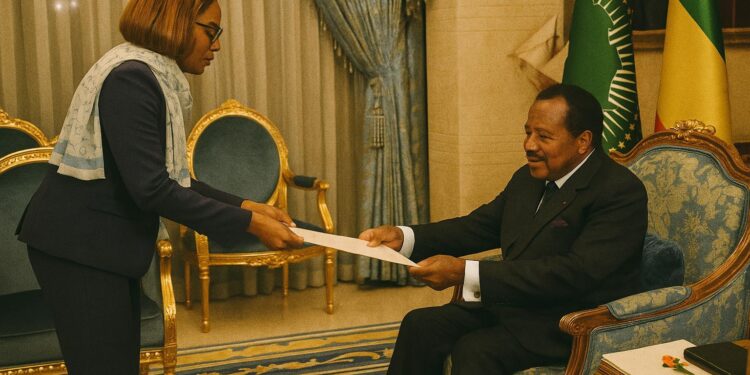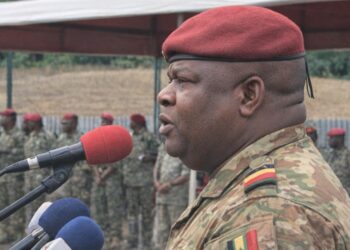Diplomatic Overture in Brazzaville
On 22 July 2023 the marble halls of the Palais du Peuple in Brazzaville hosted a meeting whose symbolism outweighed its brevity. President Denis Sassou Nguesso, accompanied by a discreet but seasoned diplomatic team, received Central African Foreign Minister Sylvie Baïpo-Temon, special envoy of President Faustin-Archange Touadéra. The minister carried an exclusively handwritten message addressing the current state of bilateral cooperation and the wider sub-regional integration process. According to officials present, the exchange unfolded in a climate of mutual confidence shaped by decades of personal rapport between the two heads of state (Jeune Afrique, 25 July 2023).
Observers noted the choreography: no formal press conference, yet carefully timed communiqués underlined the visit’s strategic intent. By placing Brazzaville at the centre of pre-summit consultations, Bangui implicitly acknowledged Congo’s role as an indispensable facilitator within the Economic and Monetary Community of Central Africa, commonly known by its French acronym CEMAC.
A Transition at the Helm of CEMAC
The August ordinary summit in Bangui will mark the end of President Touadéra’s one-year rotating chairmanship and the formal transfer of authority to President Sassou Nguesso. While rotations are routine, the region approaches this hand-over with heightened expectations. In a context of fragile post-pandemic recovery and persistent external shocks, continuity of leadership is prized. Congo-Brazzaville previously chaired CEMAC in 2012, steering the bloc through reforms that culminated in the adoption of a regional master plan on infrastructure. Diplomatic sources in Libreville suggest that Sassou Nguesso’s institutional memory was a decisive factor in the choice of sequence (UN Economic Commission for Africa briefing, May 2023).
The incoming chairmanship coincides with a scheduled mid-term review of the 2021-2025 Regional Economic and Financial Reform Program, a Touadéra-era initiative sponsored by the African Development Bank. The Brazzaville meeting therefore served to align analytical notes, ensuring that when leaders gather in Bangui the evaluation matrix will be consensual rather than contentious.
Economic Reforms under Review
At the core of the sub-regional conversation lies a delicate balance between monetary stability and developmental ambition. The Bank of Central African States reports that aggregate growth for the six-member bloc rebounded to 3.4 percent in 2022, yet public debt remains above the convergence threshold in four economies (BEAC Quarterly Report, April 2023). Under Touadéra’s guidance CEMAC introduced a suite of fiscal reforms—streamlined customs procedures, digital revenue platforms and an embryonic investment code—measures whose implementation varies markedly from Libreville to N’Djamena.
Congolese technocrats emphasise that Brazzaville has already transposed many of these norms into domestic law, notably through the 2022 Finance Act that broadened the tax base while securing concessional support from the International Monetary Fund. By taking the chair, Sassou Nguesso is expected to encourage peer adoption without compromising national sovereignty, an approach one senior official described as ‘pragmatic multilateralism’. External partners, including the European Union and the Gulf Cooperation Council, have quietly signalled readiness to expand lines of credit once the reform scorecard shows further progress.
Security Interdependence across the Oubangui River
Although economics dominate the communiqués, seasoned diplomats concede that security looms large in private deliberations. The Central African Republic continues to grapple with residual rebel activity despite the Khartoum-brokered accords, and instability can ripple down the Oubangui River into northern Congo. Brazzaville’s security establishment has therefore intensified information sharing with Bangui, focusing on riverine patrols and cross-border intelligence. A confidential African Union memo seen by regional analysts underscores Congo’s ‘constructive discretion’ in this domain, citing its facilitation of dialogue among external security actors present in CAR.
Sassou Nguesso carries considerable credibility as a regional mediator, from his role in the Inter-Congolese Dialogue two decades ago to more recent efforts within the International Conference on the Great Lakes Region. According to an adviser to the CAR presidency, the forthcoming CEMAC summit will allocate dedicated time to security-economy nexus questions, aiming to synchronise fiscal reforms with stabilisation programmes financed through the Peace and Security Council of the African Union.
Prospects for Sub-Regional Integration
As Central Africa manoeuvres among shifting global value chains, the confluence of energy transition, digitalisation and demographic momentum offers both peril and promise. Congo’s Atlantic coastline, coupled with CAR’s land-linked position, frames a complementary logistics corridor that could, if properly financed, slice transport costs and accelerate intra-African trade. The African Continental Free Trade Area Secretariat has identified the Pointe-Noire–Brazzaville–Bangui axis as a priority pilot for the agreement’s early harvest phase (AfCFTA Working Paper 7, 2023).
In this light, the impending Sassou Nguesso chairmanship is less a ceremonial rotation than a test of collective resolve. The handwritten message transmitted by Minister Baïpo-Temon distilled this reality: success will hinge on preserving the political will painstakingly built during the Touadéra tenure while injecting the administrative rigour for which Brazzaville’s technocrats are reputed. Should the August summit endorse a clear roadmap, investors and multilateral partners are likely to reward the region with improved financing terms, strengthening the credibility of CEMAC as a cornerstone of Central African stability and growth.












































